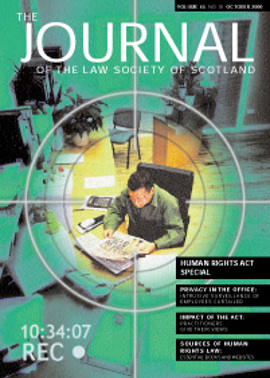Right of citizenship underpins liberty
When John Major, in his time as Prime Minister, said, “We have no need of a Bill of Rights because we have freedom”, he omitted to recognise that the challenge to liberty is not only from dictators. Governments may show “a more mundane but still corrupting insensitivity to liberty, a failure to grasp its force and place in democratic ideals.” (Dworkin 1988). As the Lord Chancellor put it in 1997, “The traditional freedom of the individual under an unwritten constitution to do himself that which is not prohibited by law gives no protection from misuse of power by the state, nor any protection from acts or omissions by public bodies which harm individuals in a way which is incompatible with their human rights under the Convention.” The number of cases in which the European Court of Human Rights has found that the U.K.has violated the Convention easily provides the proof of the validity of that approach. You do not have to look further than the daily newspapers to find them.
Not everyone is enamoured by this constitutional change. According to some press reports the upshot of the Human Rights Act will be,“ sex at school, cross dressing in the classroom and gay marriages”. In fact, the principles of the Convention have applied to the U.K. for almost 50 years.
The Act protects human rights under three categories: (a) Fundamental Rights; (b) Procedural Rights; and (c) Qualified Rights. This is to say that there is a hierarchy of rights which are absolute, limited or qualified. Absolute rights include protection from torture, enforced labour, inhuman treatment and the like. Limited rights, like the rights to liberty, a fair trial etc. are limited only under explicit and finite circumstances defined in the Convention, and qualified rights, like the rights to respect for private and family life, freedom of expression, religion, association and education may be qualified, provided that any restriction contained in a qualification must have a legal basis, be necessary in a democratic society and be related to the permissible aim set out in the relevant Article. It cannot, therefore, be said that because of the Act society, as we know it, will break down so that the extreme examples given will become part and parcel of everyday life.
The Act helps to better regulate the relationships between individuals and public authorities, creates the need for Government Ministers to scrutinise legislation to ensure that it is compatible with Convention, and empowers the Courts to protect and preserve the rights of individuals. Judges ensure that Government and public authorities are accountable. They can do so if they are independent and impartial. This is the true significance of the Scottish case of Starrs v Ruxton (2000 S.L.T. 43). Judicial independence is a fundamental article of the unwritten constitution of the UK, and a critical aspect of the Doctrine of the Separation of Powers. The Human Rights Act accentuates the division of functions among the institutions of the state, reflecting the separation of powers, and empowering the courts to interpret legislation in such a way that it is compatible with the Convention Rights. Where this proves to be impossible they will declare that legislation to be incompatible and, where appropriate, grant a remedy. In performing this function Courts will require to strike a balance between activism and restraint. This is not a wholly new task given that the Courts have judicially reviewed administrative acts over many years. The experience in Scotland to date shows that our Courts are well equipped to cope and that, where declarations of incompatibility have been made, the Executive is able to put in place speedy and sensible solutions by amending existing legislation and introducing new legislation.
The Human Rights Act may not enjoy the high profiles of the haulage protesters and the Millennium Dome but it will have a long lasting and profound effect well beyond the time when the Dome is a distant irrelevance and the petrol shortage is an obscure event in our economic history. It will change the way judges approach cases, make governments think twice when introducing legislation, check public authorities in their treatment of ordinary people, bring rights home and promote mutual respect. Most of all, it will protect minorities, and if it only achieves that goal it will significantly improve our society.
In this issue
- President's report
- Right of citizenship underpins liberty
- This time the sky is falling
- The Human Rights Act and employment law
- New challenges, new risks?
- The new Diploma in Legal Practice
- Certification required for physical evaluation
- Act permeates all types of practice
- e-mail snooping RIP
- Challenge to legitimacy of tobacco directive






